At the end of two terms in office, President Ronald Reagan left his legacy, the Reagan Revolution (Reaganomics = or supply-side economics). In Reagan's words, "government is the problem." His economic policies were intended to reinvigorate the American people and reduce their reliance on government entitlements. He believed he had fulfilled his campaign pledge of 1980 to restore "the great, confident roar of American progress and growth and optimism." However, many argue that Reagan's finest achievement was to engineer the West's victory in the Cold War.
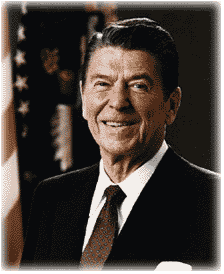 California governor Arnold Schwarzenegger proclaimed February 6th "Ronald Reagan Day." The date chosen was one day after Reagan's death. A proclamation read in part:
California governor Arnold Schwarzenegger proclaimed February 6th "Ronald Reagan Day." The date chosen was one day after Reagan's death. A proclamation read in part:
"Ronald Reagan was the quintessential American patriot, an eternal optimist who led our nation with unmatched courage, soul and wit. With invigorating energy, he set out to accomplish daunting tasks laden with grave risks, but great rewards. For this, our nation's 40th president became a hero, not only in the eyes of Americans, but to people in every corner of the globe who were looking to be led with unyielding strength and vision."
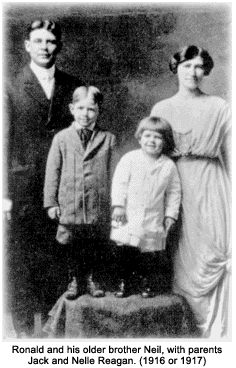 Youth and education
Youth and educationUpon graduation in 1932, he became a radio sports announcer in Des Moines, Iowa. A screen test in 1937 won him a contract in Hollywood. He headed for California, where he enjoyed a successful, if mediocre, career in movies and television. After serving in the air force during World War II, he returned to acting. During the following two decades he appeared in 53 films and became known as "the Errol Flynn of the B-movies."
Family man
His first marriage to actress Jane Wyman produced two children, Maureen and Michael. Maureen died in 2001. In 1952 he married Nancy Davis, also an actor, and they had two children, Patricia and Ronald. Nancy was a well-regarded First Lady and visible Reagan supporter throughout their life together.
Nancy Reagan's eight years as First Lady passed through three distinct stages: an initial period as a party hostess, refurbishing the White House living quarters, and expanding the White House dinnerware collection. In the second phase, she became more active in such social causes as the "Just Say No!" anti-drug campaign. In a final phase, she became protective of her husband during the Iran-Contra scandal.
A devoted couple, the Reagans helped each other through the best and worst of times. Nancy helped to revive her husband's fighting spirit while he recovered from a gunshot wound in 1981, following an assassination attempt. She was at his side as he recovered from surgeries in July 1985 and January 1987.
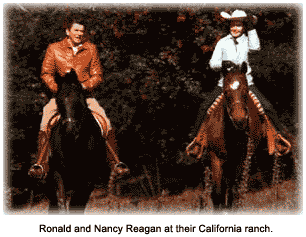 In retirement, the two former actors returned to their California ranch. The Reagans enjoyed a peaceful retirement. That time was made difficult, however, when the former president was diagnosed with Alzheimer's disease, a degenerative brain affliction.
In retirement, the two former actors returned to their California ranch. The Reagans enjoyed a peaceful retirement. That time was made difficult, however, when the former president was diagnosed with Alzheimer's disease, a degenerative brain affliction.
Conversion to conservatism
Young Reagan came to Hollywood in 1937 and three years later played George Gipp in his most acclaimed film, Knute Rockne — All American. Reagan was a Democrat who gave his name and time to groups promoting liberal policies at home and abroad. But as the Cold War began, the FBI suspected that some of those groups included Communist Party members trying to promote the Soviet cause.
As Reagan recalled in his memoir, An American Life, FBI agents approached him in 1946 to share their information about the communist effort to infiltrate Hollywood. Reagan's book suggests that the visit and other discussions with FBI agents inspired him to fight communism, which led him to run for president of the Screen Actors Guild (SAG) and "indirectly ... set me on the road that would lead me to politics."
Reagan eventually served as SAG president, and during his tenure, he became active in politics. The Republican Party was impressed by his political views and charisma, and Reagan, who had not held public office before, was elected governor of California in 1966 with their backing. Reagan was the only California governor to become president of the United States.
As president of SAG, Reagan had become embroiled in disputes over the issue of communism in the film industry. He was called upon to testify (with Walt Disney) before the House Committee on Un-American Activities (HUAC). His political views shifted from liberal to conservative during that period. He toured the country as a television host, and became a spokesman for conservatism and anti-communism. Over the years, Reagan and the FBI engaged each other through a series of contacts that catalyzed his political metamorphosis.
Thirty-third governor of California – (1967-1974)
Those were the Sixties and early Seventies, memorable for civil rights and antiwar agitation, rock 'n roll, drug experimentation and abuse, long hair and ragged clothes. California was a magnet for disenfranchised dreamers. They came in droves, they came on the bus and train, they hitchhiked from “Everytown” USA. Popular rock performers, much like the legendary Pied Piper, lyrically promised, (Scott MacKenzie tune), "If you're going to San Francisco, be sure to wear some flowers in your hair." And they came, euphoric and hopeful for a different world, but most were quickly disillusioned and went home. Some tried the rural subsistence lifestyle, but most became disillusioned with that because it was tough work.
On January 2, 1967, Ronald Reagan was sworn in as the governor of California. In 1966, he was elected by a margin of a million votes and was reelected in 1970.
During his term, he confronted students at the University of California Berkeley, considered by FBI director J. Edgar Hoover to be a communist hotbed. UC Berkeley was considered by most political observers to be the home of the American Free Speech Movement, and the administration employed avowed communists as instructors. One of them, an African-American teacher named Angela Davis, defiantly taught an accredited class on communism on the UC campus.
Civil rights, antiwar, Free Speech and "Black Power" leaders, most of them not enrolled, spoke freely and agitated on the UC Berkeley campus. Charismatic Jerry Rubin, Abbie Hoffman, Malcom X and Stokely Carmichael were among those leaders who motivated vociferous students to civil disobediance and defiance. Desecration of American flags, burning of draft cards and bras, street marches, riots and "sit-ins" became almost customary occurrences on the UC campus and in the city of Berkeley. Drug use, destruction of campus property and off-campus private property were commonplace. For the majority of the population who were not “in the groove," Berkeley became known as “Berserkley."
During a "People's Park" (a geographical flash point for protest) demonstration, Reagan dispatched 2,200 National Guard soldiers to the Berkeley campus. He made it plain that his administration's policies would not be influenced by student protestors.
During Reagan's first term, he froze government hiring, but also sanctioned tax raises to balance the budget. Also during his governorship, Reagan dismantled the public psychiatric hospital system, advocating instead a community-based housing and treatment system to supplant it. Critics argued that not enough state funding was devoted to the change.
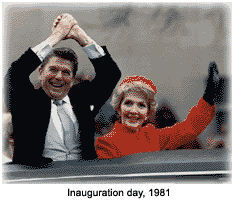 In 1979, Reagan lost a longtime friend and fellow conservative, John Wayne, from stomach cancer.
In 1979, Reagan lost a longtime friend and fellow conservative, John Wayne, from stomach cancer.
Fortieth president of the United States - (1981-1989)
Reagan won the Republican presidential nomination in 1980 and chose as his running mate a former CIA chief, Texas congressman and United Nations ambassador, George H.W. Bush. Voters troubled by inflation and by the year-long confinement of American hostages in Iran, swept the Republican ticket into office. Reagan won 489 electoral votes to 49 for President Jimmy Carter in the election of 1980.
Reagan took office on January 20, 1981. Just 69 days later, he was shot by a would-be assassin, but quickly recovered and returned to duty. His grace and wit during the dangerous incident caused his popularity to soar.
America in the throes of change
America's commercial, industrial and social sectors had been rapidly evolving from changes spawned in the decades following World War II. Tremendous pressures had built up by the time Reagan took office. Factories continued to close across America, being replaced by "outsourcing" in foreign countries that offered lower business costs and cheaper labor. Moving the factories offshore was a counter-strategy by business and industry leaders who refused to countenance the ongoing demands of American labor unions. Hundreds of thousands of Americans had been thrown into unemployment and many became homeless as well.
Concurrently, the personal computer was born, to be followed by the computer revolution in businesses, schools and homes across America and Europe, followed by the rest of the world.
Such controversial federal policies as Affirmative Action (some called it "reverse discrimination"), sought to inject racial and gender equality into many aspects of American life, especially college enrollment and workplace hiring practices.
The rise in drug abuse and addiction became epidemic, followed by a rise in crime (aggravated by illegal drugs), which overcrowded America's prisons. The pandemic of HIV/AIDS bowled its way into the American mainstream, costing many lives and billions of dollars (not including the disease's foreign impact).
Dealing skillfully with Congress, Reagan obtained legislation to stimulate economic growth, curb inflation, increase employment, and strengthen the national military muscle. He embarked upon a course of cutting taxes and government expenditures, refusing to deviate from it when the cost of bolstering defense forces led to huge deficits.
The SALT treaty with Soviet Russia had failed. A new treaty called "START" was created in 1983.
The Election of 1984 was a contest between incumbent Reagan and former vice president Walter Mondale. Reagan's running mate was George Bush again. The president was popular, partly because his first term had seen the beginning of a strong economic boom and a resurgence of American military strength. Mondale was unable to deflect those positives or Reagan's charisma, and lost in every state in the union except for his home state of Minnesota.
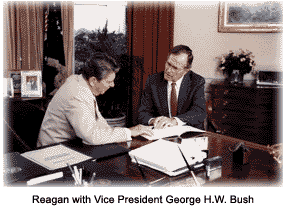 The Reagan Cabinet contained some controversial members. Most memorable was the brusque, outspoken Secretary of State Alexander M. Haig Jr. (1981-1982), who had stepped in to front for Richard M. Nixon during the latter's desperate final days in office (1975). Interior Secretary James G. Watt (1981-1983), who is remembered chiefly for his hostility to the environmental movement and support of the development and use of federal lands by foresting, ranching and other commercial interests, was forced to resign following a controversial ethnic quip.²
The Reagan Cabinet contained some controversial members. Most memorable was the brusque, outspoken Secretary of State Alexander M. Haig Jr. (1981-1982), who had stepped in to front for Richard M. Nixon during the latter's desperate final days in office (1975). Interior Secretary James G. Watt (1981-1983), who is remembered chiefly for his hostility to the environmental movement and support of the development and use of federal lands by foresting, ranching and other commercial interests, was forced to resign following a controversial ethnic quip.²
Foreign Policy
Europe Margaret Thatcher was the British prime minister during the Reagan era. Thatcher was a close ally and friend of Reagan's, and both were tough conservatives. The two politicians affected 1980s politics worldwide. He was president for eight years; she was PM for 11 years. Thatcher was the first national leader to visit him after his inauguration in 1981, and their rapport helped to transform the East-West standoff. The Reagan era is remembered most for his conservative economic reforms and Cold War success.
The cradle of the Cold War (1946-1989) was West Germany and the Berlin Wall. Reagan's historic speech at the Brandenburg Gate in West Berlin on June 12, 1987, was the harbinger marking the coming end of the Cold War when he demanded, “Mr. Gorbachev, tear down this wall!”
The Middle East. Harry S. Truman's administration advocated "containment," a historic direct confrontation with the "Domino Theory"³ of communist hegemony, and three presidential successors maintained it. But it was Reagan who prophetically saw that the time had come to tighten containment and finally destroy Soviet Communism. Like Franklin D. Roosevelt before him, he sought to destroy an "evil empire," not just contain it.
Despite such developments as the U.S.-Palestine Liberation Organization dialog, the Pollard spy case in December 1986, and the Israeli rejection of the Shultz peace initiative in the spring of 1988, pro-Israeli organizations in the United States characterized the Reagan administration (and the 100th Congress) as the "most pro-Israel ever" and praised the positive overall tone of bilateral relations.
Irangate. The Iran-Contra Affair, in which U.S. arms were sold to Iran to secure the release of American hostages and fund so-called "Freedom Fighters" in Nicaragua, was a mid-1980s political scandal during Reagan's second term. Many consider his prevarications during the scandal to be the low point of his presidency.
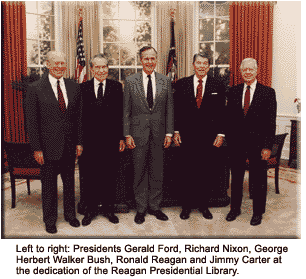 Epilogue
Epilogue
Reagan's leadership brought the international nightmare of the Cold War to a conclusion. Many historians aver that he also restored a sense of honor and trust to the White House, which had been so tarnished by the events in the years that preceded his taking office, including the Vietnam War, the Pentagon Papers, and the Watergate Scandal. Ronald Reagan had refashioned the American presidency.
The former president died of pneumonia as a complication of Alzheimer's disease, on June 5, 2004, at the age of 93. He had announced in 1994 that he was suffering from the disease. Reagan's wife and two of their children, Ronald Jr. and Patty Davis, were with him when he died.